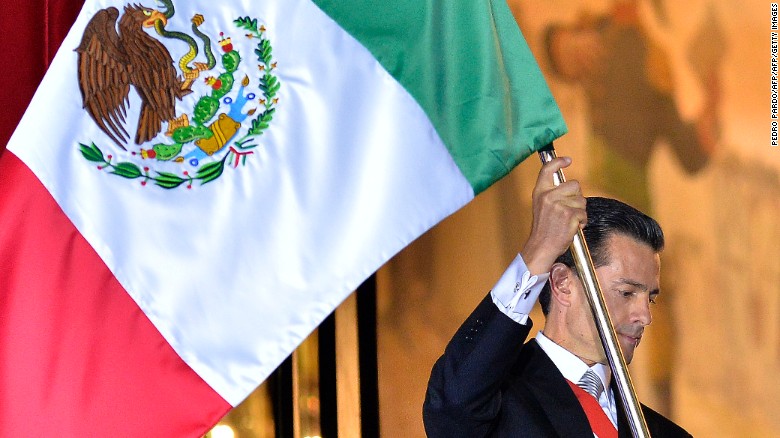(CNN) United States President-elect Donald Trump will have a lot of global challenges to deal with, and Mexico is one of them. Here's what you need to know.
Trump on Mexico
"I would build a great wall and nobody builds walls better than me, believe me and I'll build them very inexpensively. I will build a great, great wall on our southern border. And I will have Mexico pay for that wall," Trump said in his announcement speech in June 2015.
One statistic that sums up the Mexico issue
Mexicans abroad, mainly in the US, sent nearly $25 billion in 2015 to their relatives and loved ones back home, Mexico's Central Bank reported in early February. That's a 4.75% increase from the previous year.
It's the first time remittances were the most important source of revenue for Mexico since 1995, when the Bank of Mexico (Banxico) started tracking the figure. Oil has always been Mexico's cash cow oil exports earned Mexico $23.4 billion in 2015 but the sharp decline in petroleum prices has significantly changed the equation.
Remittances are an important indicator of the symbiotic economic relationship between Mexico and the US. When Mexican immigrants feel the US labor market is hostile to them - regardless of whether that hostility is real or perceived they tend to return home, and therefore, remittances decrease.
Ironically, a reduction in remittances hurts local economies and creates an incentive for other Mexican laborers to migrate (legally or otherwise) to the US.
What should be Trump's top priority on Mexico in the first 100 days?
The Mexican peso has lost about a third of its value in the last two years due to many factors, including plunging oil prices and emerging-market jitters. The US presidential election seems to have had a significant impact as well.
Trump promised to build a wall between Mexico and the US if he won the presidency. The President-elect also vowed to renegotiate the North American Free Trade Agreement (NAFTA), a trade agreement between Mexico, the US and Canada that has been in effect since 1994.
This kind of rhetoric caused anxiety among investors who feared that a Trump presidency would jeopardize trade between the two countries, which totaled $583.6 billion in 2015.
The top priority on Mexico for Trump should be giving assurances that trade between the two countries will not be disrupted -- and that both countries will continue to be partners in other areas, including fighting drug cartels and protecting the rights of each other's citizens.
Can Trump right the ship with Mexico in the first term?
It's complicated. The presidential campaign made it clear that a significant portion of Americans Trump supporters would not object to rounding up millions of undocumented Mexican immigrants and deporting them.
The US and Mexico have always been dependent on each other, but it's a complicated love-hate relationship between two countries that don't see each other as equals, have different priorities, and are led by politicians who don't understand or trust each other.
A glaring example is the war on drugs. The US criticizes Mexico for its multiple criminal drug cartels and for its failure to end the violence and climate of impunity created by the narcos over the decades. And Mexico is critical of its neighbor for its seemingly insatiable appetite for illegal drugs -- a demand that fuels the drug trade with American dollars and creates a market for illegal assault weapons in Mexico.
One solution to this problem could be a binational agreement to selectively legalize controlled substances like cannabis, while working jointly to focus law enforcement efforts on hard drugs and crimes like extortion and kidnapping.
Another big challenge is illegal immigration. The US criticizes Mexico for failing to create the kind of economic conditions that would ensure Mexican laborers stay home, instead of risking their lives by illegally crossing the border. In turn, Mexico accuses the US of hypocrisy for exploiting illegal Mexican labor in the hospitality and construction industries, not to mention agriculture.
A deal on comprehensive immigration reform will be difficult to achieve. But a good start would be a worker program that allowed Mexicans to work legally - and temporarily - in the US for industries that have historically had a shortage of workers.
How big a priority is Mexico for CNN readers?
Mexico ranked 6th in this very unscientific poll of CNN readers who took part in our interactive feature on the 10 biggest global challenges facing the next President.
What's your biggest priority for President-elect Trump? Take our quiz and let us know.

No comments:
Post a Comment